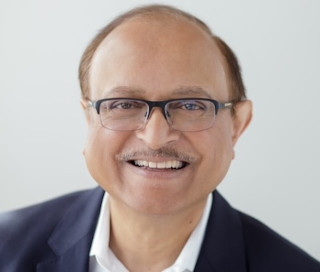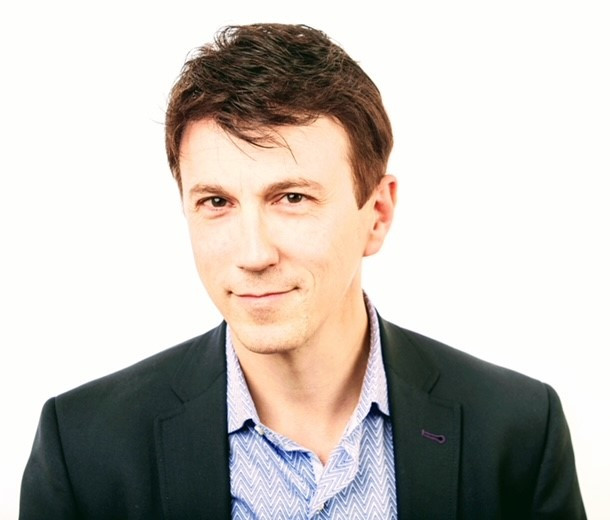RamaOnHealthcare March 4, 2023
Welcome to the RamaOnHealthcare. This is about the NextMed Health Imagine The Future Conference being held this March 13-16th in San Diego.

Mohan Nair, CEO of Emerge Inc.

Daniel Kraft, MD, Founder & Chair of NextMed Health and Digital.Health
Mohan: Daniel Kraft, MD, has been a transformative leader in the world of healthcare. Yet I also know him as a humanist with technology tendencies as his work is focused on bringing transformation to the healthcare world with technology, and new models into practical focus. He chairs NextMed Health (the evolution of Exponential Medicine), being held this March 13-16th in San Diego. I asked him for this interview to gather insight into his work and into the recent views of technology in light of recent advances.
Let me get right to the point, as I know you appreciate elegance and brevity.
Daniel: Thanks … “Brevity is the soul of Wit”
Mohan: Recent ChatGPT-like technologies have answered the questions of AI at a human level, and it has caught the imagination of large audiences. What are the implications to the healthcare industry, given ChatGPT passed exams directed to MDs?
Daniel: The implications for healthcare are significant (and ChatGPT has only been out for a few months!), and we are experiencing head-spinning exponential advances within AI. But we shouldn’t have a failure of imagination for the art of the possible.
I’ll remind you of Amara’s Law, which states, “We tend to overestimate the effect of a technology in the short run (i.e. 2 years) and underestimate the effect in the long run (decade)”. Just like with IBM Watson in 2011, the ‘AI Doctor’ was hyped and expected to be around the corner. But it took another decade to see AI/ML integrating meaningfully into healthcare. New AI-based tools were approved by the FDA at an increasing rate. Currently, we are consistently integrating AI and Machine Learning into workflow and shifting outcomes in many arenas.
…’We tend to overestimate the effect of a technology in the short run (i.e. 2 years) and underestimate the effect in the long run (decade).’
I envision a potential future of ‘Generative Health’ where much of the healthcare journey will be mediated by highly adaptive personalized elements and engagement. From our healthcare coaches/avatars to the paper, VR/AR, app, etc. format, these could constantly adapt to meet the unique characteristics of an individual. They can also share the integrated ‘medical history’ of an individual synthesized from multiple, often continuous, data sources.
As an example, imagine your proactive or preventative regimen integrating specific music within your personalized diet and exercise in a virtualized environment generated just in time, and specifically for you. Clinical encounters and follow-ups provide instructions/guidance in age/culture/education/personality type matching form to dramatically improve patient engagement, adherence, and outcomes. Additionally, we can look forward to n=1 medications, omni-channel care, and any time anywhere care in a form and function that readily matches the individual, local culture, and more. And with crowdsourced, integrated, and always updated information, the clinician decisions will be guided in a ‘Waze-like’ fashion, while integrating the lessons and learnings from 1000s of patients and millions of physical, virtual, and digital encounters.
Mohan: The Technology industry has tried to enter and dominate healthcare for years and this promise has not expressed itself. What is missing?
Daniel: We need aligned incentives in many settings, especially across our many and variable healthcare systems. This includes workflow elements to enable tech to meet the needs of remote and diverse areas, including clinics, home bedsides, and remote locations. Amazing solutions developed by technology cannot be impactful against some ‘incremental’ mindsets within healthcare. These solutions also must be readily dependably, easily accessible, paid for, and based on rigorously demonstrated evidence. That’s one of the reasons I founded and built Digital.Health as a platform to find, match and utilize the digital health tools and solutions that match the needs of a patient, clinician, or healthcare system.
…I founded and built Digital.Health as a platform to find, match and utilize the digital health tools and solutions that match the needs of a patient, clinician, or healthcare system.
Mohan: We have the best minds in healthcare, the best in technology, the best in process optimization, and the committed executives who want to improve both the system and the health, access, satisfaction, lives, and outcomes of patients. So, why is completing the promise of healthcare transformation taking so long?
Daniel: Some of the ‘hold up’ is based on well-meaning, but pre-digital age regulations like HIPAA that, in my view, need an update for the 2023 era. Today, it is imperative to NOT silo our data and make it less challenging to share – while still maintaining privacy. We need to accelerate the generation of big data, to insights and knowledge that can more rapidly translate to use at the bedside, website, or increasingly in our hybrid, metaverse-enabled healthcare at-home world.
Mohan: We have limited time to get something accomplished, given so many structural changes happening in healthcare. What is your primary focus, given your vast involvement in the industry?
Daniel: I don’t see it as a matter of ‘transforming the healthcare system’ but one of helping converge the mix of problems, people, ideas, and cross-fertilization (increasingly coming from other industries) with a mindset to ‘solve for health’ in novel ways. One example that I played some role in, is having Tony Young (NHS Lead for Innovation) who came to my early Exponential Medicine programs. He noticed the handicapping of clinicians interested in being entrepreneurial. He founded and lead the NHS Clinician Entrepreneurs program, which has expanded dramatically and will make a major impact on the NHS and globally. Sometimes that impact makes a spark and requires a decade to fully manifest.
…helping converge the mix of problems, people, ideas, and cross-fertilization… with a mindset to ‘solve for health’ in novel ways.
Mohan: I notice your extreme focus on NextMed Health. Tell us why and what is taking this attention?
Daniel: NextMed Health is a unique gathering coming up March 13-16th to explore the convergence of technology, healthcare, and the art of the possible. The most interesting things happen at the convergence and interfaces where unusual and often unlikely collaborations and cross-connections occur. As a bit of an accidental futurist and accidental healthcare curator, I was fortunate in 2011 to bring my friends and colleagues from across the healthcare continuum and its many clinical silos, and those within the diverse healthcare-engaged technology spectrum together to explore the ‘future of medicine’. From 2011 to 2019, I chaired Exponential Medicine (xMed), bringing up to 700 diverse and forward-thinking people together at the Hotel del Coronado. There, we collectively explored the cutting-edge and shared lessons and inspiration. It was not a ‘trade show’, or highly commercial, but instead, a bespoke discovery zone where folks could meet and touch the future early. For example, we featured the Moderna CEO in 2015, when no one had heard of mRNA). Many new endeavors, partnerships, and initiatives emerged from the community that met there. Now as we emerge from the pandemic, we are more used to a blended/hybrid world. NextMed Health is the evolution of Exponential Medicine. It meets at the Hotel del Coronado with over 60 amazing faculty, and 60 startups in the Innovation Lab. It maintains the ambition to keep its global community interconnected and collaborating in a variety of methods with the goal of accelerating a new ‘Health Age’ that is technology-enabled, human-centric, democratized, and made more available across the planet.
Mohan: What are you planning to accomplish with another gathering of minds? We have several who promise transformation through such gatherings.
Daniel: “Sometimes the challenge isn’t the new ideas – it’s escaping from the old ones.” We also want to shift from the ‘What’s New to the “How to”… it’s now less about the technology and more about how to bring its potential to move the needle on prevention, diagnosis, therapy, and global and public health.
‘Sometimes the challenge isn’t the new ideas – it’s escaping from the old ones.’
Mohan: If you could advise the industry to do one thing this year, what would it be?
Daniel: Not to do just ‘one thing’… but to look to ‘future proof’ a bit and aim to design, build, and evolve healthcare ‘systems’ that can integrate the new forms of integrated multi-omics, remote patient monitoring, and continuous, proactive information tailored to the individual, clinicians, and community.
Mohan: Daniel, I have always been a fan of your work and direction. I know that you are tireless in your pursuit to transform the healthcare system using all tools available from business model redesign, applied technologies, and new forms of delivery. I wish you well in gathering the best to do the best at NextMed Health. Thank you for joining us!
About Mohan Nair
Mohan Nair is the CEO of Emerge Inc, and all about innovation and transformation. He is a three-time corporate executive and three-time emerging business executive with two exits. He is also a 17- year EVP/SVP/Innovation Officer at a national health plan and a three-time best-selling author(Wiley publishing). He is a sought-after keynote speaker and moderator. He is a Sir Edmund Hillary Fellow for Aotearoa New Zealand, Innovator-in-residence to MOVAC capital, and advisor to Caramed. Find him at MyLinkedIn.
About Daniel Kraft
Daniel Kraft is a Stanford and Harvard-trained physician-scientist, inventor and entrepreneur and is the founder of NextMed Health and Digital Health. He chairs the XPRIZE Pandemic & Health Alliance Task Force, is an Aspen Institute Health Innovators Fellow and is member of the Kaufman Fellows Society. Dr. Kraft has served as faculty chair for medicine for Singularity Univerity since its inception, and has given 6 TED & TEDMED Talks on the future of medicine. He completed the Harvard combined residency in Internal Medicine & Pediatrics, and fellowships in hematology/oncology & bone marrow transplant at Stanford and has served for 14 years a flight surgeon in the Air National Guard.





